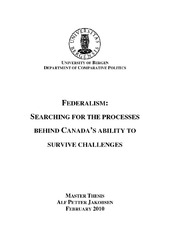| dc.description.abstract | The purpose of this master thesis is to look into what gives federations better abilities to survive challenges, with a focus on the survival of the Canadian Federation.There are several theories in chapter two that provide a better understanding of the concepts in this thesis. The two first are the difference between federal and unitary states, and the difference between three common methods of organizing a federal government. The third is state building and its opposite of state failure. State building and state failure combined forms the dependent variable of this thesis, as I wish to discover why Canada has remained in its “state building mode” without falling into the state failure category.This master thesis uses two qualitative methods to gain an understanding of the processes behind the continued survival of Canada. The first method of case studies serve as the information gathering tool, while the second method of process tracing is used to analyze the information provided by the empiric sources. Canada which has been descriptively reviewed from the days of colonization until today provides the main bulk of the data. Examples of federal states that encountered state failures are also included in order to make a comparative analysis possible. The four nations of the United States of America, Nigeria, India and former Yugoslavia were selected in order to provide information on federal states that failed to tackle one or several challenge(s). The method of case studies also allows other analytical units to be brought in the analysis.The analysis uncovered that economics can be an important factor in keeping the processes in a federation positive. Economics does however not explain why Canada survived the challenges during the Great Depression of the 1930s, while Yugoslavia succumbed to economic troubles during the 1980s. The analysis shows that a well written constitution may prove crucial in handling challenges. The surprising part is the likely top governing factor that seems to be involved in determining the stability of a federation: popular trust. Negative popular trust over a time seems to have a severe impact on state stability.My conclusion is that the ability of the constitution to address a possible weak/conflict spot within a federation might be critical. The constitution of Canada has most of this in place, though some weaknesses could be present as the province of Quebec remains distrustful of the Canadian union. It also seems that the various process chains that are active in a federation should concentrate on keeping the popular trust positive. A good economy and a fully functional legal system seem to be two key components in maintaining popular trust. | en_US |
